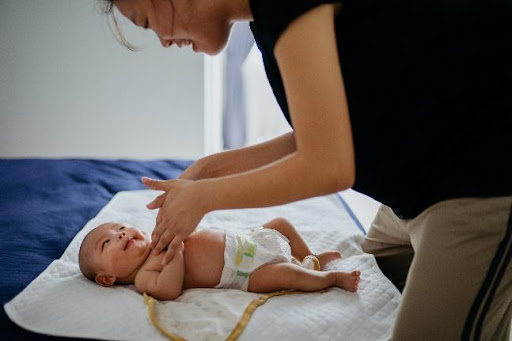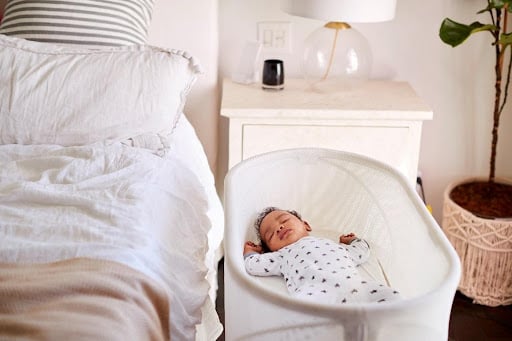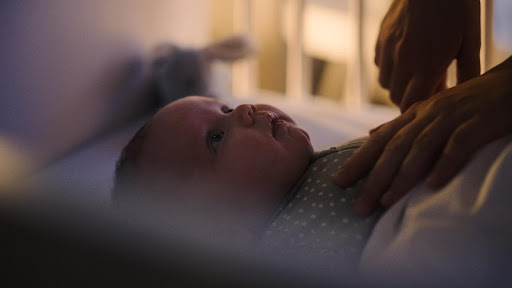So, you have navigated the tricky waters of pregnancy, birthed your baby (or babies) and now begins the fun part: raising your tiny human.
That includes feeding, changing, emotional support, and, crucially, sleep!
Ah, sweet sleep, the holy grail of being a parent and one of the most discussed baby topics.
All new parents want an answer to this question: “How can I get my baby to sleep through the night?”
This blog will offer suggestions that help you to understand more about the how, when and whys of baby sleeping and what to expect in those early weeks and months. So, sit down, make yourself comfortable, grab a brew and let’s begin!
What is a good sleep routine for a newborn?
Your baby will not be born with a routine of any sort, and this is something that you can develop together over time.
The early weeks will be spent feeding, changing, and sleeping several times daily. Gradually as you introduce a routine, your baby will often (not always) learn that they can settle for more extended periods (hopefully at night) and that you have not abandoned them.
Babies need to feel safe; they ask for nothing more than to be fed, kept warm and secure, and loved.
If your baby is put to sleep in a safe, warm, loving, cosy environment where they know you are nearby to soothe and resettle them if needed, they will be more readily settled than a baby who feels overwhelmed.
The key to a routine is to keep it familiar each time you put them down to sleep, especially at night. Your baby will gradually recognise the cues and associate them with sleep.
Newborn sleep routine
Here are some steps you may choose to include in your routine:
- Dim the lights and keep noise to a minimum to help your baby to wind down.
- Bath your baby. Some babies love it, and others don’t enjoy bath time, so follow the baby’s cue. Read more on how to bath your baby here.
- Massage your baby using baby-specific products. Many babies enjoy the soothing touch of their parents, but again, take the signs that your baby is giving you to gauge how happy and comfortable they are. Check out our baby massage guide to learn more.

- Read to your baby. It doesn’t matter whether it’s a baby book or Shakespeare. They just want to hear your familiar voice.
- Cuddle or feed your baby to sleep. You cannot spoil a baby, so do what suits you and your baby. Learn more about breastfeeding positions here.
Teething, hunger, illness, and dirty or wet nappies can all interfere with sleep routines, so try to address those before settling your baby.
As a parent, you should also introduce an element of flexibility into the bedtime routine. Recognising when your baby is tired and ready for sleep is vital to starting the sleep schedule rather than scheduling set times.
How much sleep does my baby need?
How long should a newborn sleep?
It’s hard to say for sure, as it depends on your baby’s particular needs. Newborn babies will sleep more than they are awake (up to 18 hours per day) during the first couple of weeks. They will gradually become more alert and have longer wakeful periods.

They will wake for feeds, which should be offered at least 8-12 times in any 24-hour period, as the baby requires. They may also wake if too hot, too cold or if they need changing.
This period is ideal for new parents to rest, recover from pregnancy and birth, and adapt to life with a new baby. By the time your baby is 3-6 months old, they may be sleeping for more extended periods at night but will still need several daytime naps, although these may now be shorter.
So, how much do newborns sleep?
All babies sleep at different times, for different periods and settle in different ways, just as adults do.
Sleep outside the womb is new to babies. They need to feel safe, warm, loved, and reassured. They do not understand the concept of day and night and frequently nap throughout both, gradually developing a sleep-wake cycle more in line with older children and adults.
However, this takes time, and parents need to understand how to cope with this. It’s all part of the baby sleep training process.
Where should your newborn sleep?

It is considered that the safest place for your baby to sleep in their first six months is in their own clear, flat, separate sleep space in the same room as you.
You can put your newborn down to sleep in a Moses basket, a bedside crib, or a cot.
Wherever you choose, there are a few simple rules to follow for maintaining safety standards for safe sleeping, which you can read in the section below.
Moses Baskets
Moses Baskets are lightweight, portable baskets (often woven) usually placed on a fold-up stand, which can be moved from room to room so the baby can sleep wherever you are.
These are suitable for newborns, but babies do outgrow them quite quickly. So, you may get up to 2-6 months of use from one.
Bedside Cribs
Many specialist products can be placed right up against your bed on an adjustable stand so that it sits at the same height, and some attach directly to your bed frame.
The benefit of these units is that you can keep your baby close to you whilst keeping them in a safe separate sleeping space.
Cots
These are larger, often wooden versions of a crib with fixed legs, raised slatted sides, and rails to prevent the baby from falling out or climbing out.
These are safe for newborns and often up to two years old (especially if the cot transforms into a cot bed by removing the cot sides).
Some cots have a function that allows you to raise or lower the mattress height, making it much easier to put your baby into the cot or take them out of it.
How should a newborn sleep?
In the latter stages of your pregnancy, your healthcare provider will discuss the topic of safe baby sleeping.
Over recent years, extensive research has focused on safe sleeping for newborn babies, aiming to find ways to reduce Sudden Infant Death Syndrome (SIDS).
SIDS is the unexplained death of babies less than one year of age that occurs in less than 0.03% of babies (in the UK), usually during their sleep.
This research has resulted in a compilation of straightforward measures parents can take to further reduce the risk of SIDS and accidental harm to their babies.
So, this is how your baby should sleep:
On their back
A newborn baby should always be on their back to sleep, following safe sleeping guidance.
Although you may feel your baby would settle better on their tummy or side, recent research shows that these positions increase the risk of SIDS. So, it is advised to avoid allowing your baby to sleep in these positions.
The exceptions to this rule are:
- Premature babies are often laid prone (face-down), as research suggests it helps improve their breathing and oxygenate their bodies.

- Babies that can roll over themselves from back to front and back again.
- If a doctor has advised that the baby should be laid prone for medical reasons.
On a safe surface
Put your baby to sleep in a Moses basket, a cot or a crib designed for a baby to sleep safely.
Always use a new good quality, firm mattress for each baby. Ensure whatever you choose is age and weight-appropriate.
At the bottom of the cot
Place your baby feet to foot. That is, ensure their feet are at the foot of the basket, crib or cot to avoid them wriggling down under covers.
In the same room as you
Have the baby room-in with you for at least the first six months. This includes during their daytime naps, so you can always observe them.
With suitable covers
Use a well-fitting baby sleeping bag or, if using blankets, place them no higher than under their armpits and tucked in securely so your baby cannot pull them over their head. Avoid the use of quilts and duvets.
In a cool room
Ensure your baby doesn’t get too hot. Keep the room temperature ideally between 16-20 degrees Centigrade. Feel their tummy or back of their neck with your hand, and if they feel hot, sweaty or clammy, remove some layers.
With their head uncovered
A baby whose head is covered can rapidly overheat, so avoid using hats indoors and take all hats and hoods off as soon as you are inside.
Following all safety guidelines if you choose to co-sleep
Only co-sleep if you have a safe space to do and never co-sleep if you or your partner are smokers, have taken drugs or alcohol, or are over-tired. If you choose to share a bed with your baby, follow the Lullaby Trust recommendations for safer Bed Sharing.
Never on an armchair or couch with you
This increases the chance of SIDS 50-fold and the risk of accidental death, as babies can slip into unsafe positions where they may struggle to breathe.
Away from second-hand smoke
Ensure that anyone who smokes does so outdoors and thoroughly wash their hands, arms and faces at least 30 minutes before handling your baby.
It is also recommended that smokers change their clothes before coming into contact with a baby. Passive smoking has proven links to SIDS and respiratory illnesses.
On a sleeping area that is kept clear
Avoid mobiles, cot bumpers, sleep aids, pillows, toys etc., in your baby’s sleeping space. Your baby may roll into them and not be able to roll away and suffocate, or they may get tangled in the strings of mobiles and toys.
Sat up or held by an adult if drinking from a bottle/cup or self-feeding
Never give your baby a bottle, a cup, or solid food to self-feed whilst in bed, as they can easily choke.
Tips to get your newborn off to sleep
Keep it calm
When dealing with night waking, try to dim the lights, using a low light lamp rather than the main room light. Soft voices can help your baby to relax and help you to teach your baby to fall back to sleep in a calmer manner.
Re-think that nappy change
Nappies may not need changing overnight unless they’re dirty, very wet, they object, or their skin reacts badly to a wet nappy.
Let them feed while you sleep
Many breastfeeding mothers and nursing parents can get the knack of feeding lying down. And, with a safe bed-sharing set-up, they can latch the baby on and go back to sleep. A side-along cot may be the second best option, so when the baby is asleep after a feed, you can slide them into the cot.
Read our advice on breastfeeding positions for more ideas.
Wear your baby
In the daytime, it’s very common for babies to struggle to nap when they’re not being held. For this reason, lots of babies love being in a sling when trying to fall asleep.
They know they’re safe and close to you, which helps them relax and drop off to sleep. Sometimes, when they’re deeply asleep, you may be able to put them down. But don’t be surprised if they wake up with a start. That’s normal.
Work with, rather than against, your baby’s instinct
This means recognising a few crucial things:
- You can’t spoil your baby.
- Your baby’s need to be held isn’t manipulation or control. It’s their survival instinct and need for connection kicking in.
All children do eventually fall asleep on their own. However, this can sometimes take years, not months.
Try a swaddle or womb sounds
One key thing parents often overlook when their baby is struggling to sleep is considering what their baby is wearing at bedtime.
But what should a newborn wear to sleep?
Some babies (but certainly not all!) love being tightly swaddled, which may remind them of the womb. Special toys with recordings of womb sounds can also help settle a fractious newborn, but they don’t work for every baby.
None of these is a real substitute for their mother. So, if you want to hold your baby but are worried that you’ll spoil them, be reassured that you’re responding to your baby’s deepest needs instead of giving in to your emotions.
Consider a dummy
If you’re one of the millions of parents asking, “can newborns sleep with a dummy?” The answer is YES!
Some parents want to give their baby a dummy, and this is an entirely individual choice, but it is essential to understand the pros and cons:
- A dummy may help your baby to settle.
- If you are breastfeeding your baby, your healthcare provider will advise you to wait until breastfeeding is established (usually by about six weeks) before introducing a dummy. Introducing a dummy too early may cause sucking confusion and interfere with feeding.
- Some research suggests that dummies may reduce the risk of SIDS, but further research is needed in this area.
- If the dummy falls out of your baby’s mouth, this may disturb and wake them up. Newborn and young babies will need your help to replace the dummy in their mouths.
- Dummies can harbour bacteria, viruses and fungi if not cleaned and sterilised after each use, increasing the risk of infection to your baby.
How long do sleepless nights last with newborns?

As with children and adults, babies need differing amounts of sleep.
As such, some babies will sleep longer at night than others. Some will take months or even years to sleep through the night. But, usually, for the first 3-4 months, babies will need feeding on average every three hours.
Newborn babies have little ‘tummies’ and need to feed little and often. This might feel like a constant need to feed, but it’s the best way to keep them full and satisfied throughout the day and night.
A minimum of 8-12 feeds in a 24-hour period is recommended, which includes night feeds. So, it’s important to factor this into your newborn sleep routine. Otherwise, you might find your newborn crying in sleep throughout the night.
Babies grow quickly, and their tummies only need small volumes of milk to fill them, so they need regular feeds to meet their nutritional requirements.
What goes in also comes out! And babies pee and poo many times a day/night, needing regular nappy changes and settling.
Babies who breastfeed may continue to do so frequently through the night, regardless of age or whether they have weaned onto solids. Formula-fed babies will likely only need one or two feeds overnight after six months of age.
By 12 months, some babies may sleep over eight hours without needing a feed, but breastfed babies may still require nursing, as breastfeeding is not just about nutrition.
Yet babies don’t always wake to feed – they may be cold, hot, unwell or just want a cuddle or play.
Helping babies settle back to sleep after night waking can be a big part of night-time parenting. This can be made easier with an understanding of baby behaviour and support from your partner and family.
Understanding that ‘sleeping through the night’ is not normal baby behaviour is essential. Once you understand this, it becomes much less frustrating and enables you to start learning new techniques for dealing with a restless baby.
Summary
Sleep is vital to the health and general well-being of your newborn. They are transitioning from a dark, warm, safe, snug environment in the womb to a noisy, bright, massive, alien space. It can be overwhelming. They need time to process this, grow and learn - all of which can be exhausting.
Getting your newborn to sleep may seem like a mammoth task, and it’s always a topic of conversation amongst well-meaning friends and family.
The truth is that all babies are individuals and will sleep varying lengths of time at different times of the day depending on their own needs, just as with adults.
There is no such thing as a “good baby” or a “naughty baby”. Eventually, all babies will settle into a routine, but they need your help to establish this. Sometimes it's trial and error to see what works for you and your baby, but the most important thing is to adopt safe sleeping rules. The rest is up to you and your baby.
A wise woman (my mum) once said after a bout of sleepless nights, “by the time they start school, they should be in a better sleep pattern”!
My Expert Midwife has developed a range of products suitable for newborns that you may wish to incorporate into your bedtime routine.



















